Java developers are at the heart of software development teams, creating and maintaining applications that power businesses. They ensure robust, efficient back-end functionality, which is critical for both web and desktop applications.
Skills required for a Java developer include a strong grasp of Java fundamentals, frameworks like Spring and Hibernate, and understanding of RESTful APIs and database management. Additionally, problem-solving and effective communication are necessary for success in this role.
Candidates can write these abilities in their resumes, but you can’t verify them without on-the-job Java Developer skill tests.
In this post, we will explore 8 essential Java Developer skills, 10 secondary skills and how to assess them so you can make informed hiring decisions.
Table of contents
8 fundamental Java Developer skills and traits
The best skills for Java Developers include Java Proficiency, Spring Framework, RESTful APIs, Database Management, Version Control, Unit Testing, Build Tools and Multithreading.
Let’s dive into the details by examining the 8 essential skills of a Java Developer.
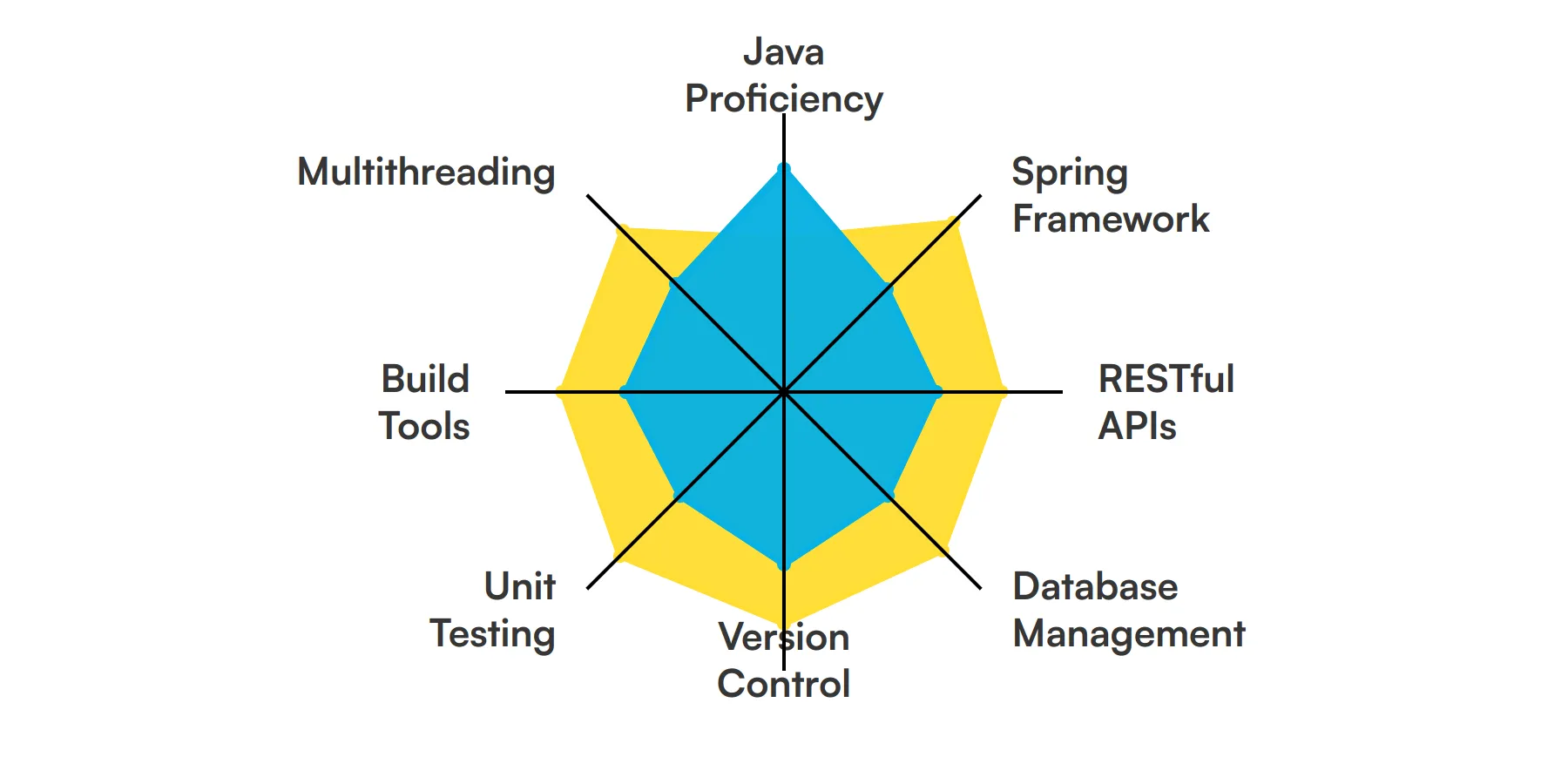
Java Proficiency
A Java Developer must have a strong grasp of Java fundamentals, including object-oriented programming, exception handling, and using Java libraries. This skill is crucial for writing clean, efficient code and understanding the nuances of how Java interacts with different systems and applications.
For more insights, check out our guide to writing a Java Developer Job Description.
Spring Framework
Knowledge of the Spring Framework is essential for a Java Developer, as it simplifies the development of complex, enterprise-level applications. It provides a comprehensive programming and configuration model that enhances a developer's productivity and application performance.
RESTful APIs
Creating and integrating RESTful APIs is a common responsibility for Java Developers, enabling them to connect applications and services efficiently. Understanding how to design, consume, and secure these APIs is key to facilitating seamless communication between different software components.
Check out our guide for a comprehensive list of interview questions.
Database Management
Java Developers often interact with databases, requiring skills in SQL and knowledge of JDBC or ORM frameworks like Hibernate. This skill helps in managing data persistence, an essential aspect of software applications that deal with storing and retrieving data.
Version Control
Familiarity with version control systems, such as Git, is necessary for Java Developers to manage changes to the project codebase, collaborate with other developers, and maintain a history of project evolution. This practice supports team collaboration and code quality assurance.
Unit Testing
Writing and maintaining unit tests is fundamental for Java Developers to ensure their code works as intended before it goes into production. Using frameworks like JUnit allows developers to automate testing and find bugs early in the development cycle.
Build Tools
Proficiency in build tools like Maven and Gradle helps Java Developers automate the project's build process, manage dependencies, and ensure that the software builds consistently across different environments. This skill is key to maintaining an efficient development workflow.
Multithreading
Understanding multithreading and concurrency is important for Java Developers working on high-performance applications. This skill helps in optimizing the application to handle multiple tasks simultaneously, improving the overall efficiency and user experience.
10 secondary Java Developer skills and traits
The best skills for Java Developers include Web Technologies, Cloud Services, Microservices Architecture, Containerization, Security Practices, Performance Tuning, Agile Methodologies, DevOps Practices, UI/UX Design and Scripting Languages.
Let’s dive into the details by examining the 10 secondary skills of a Java Developer.
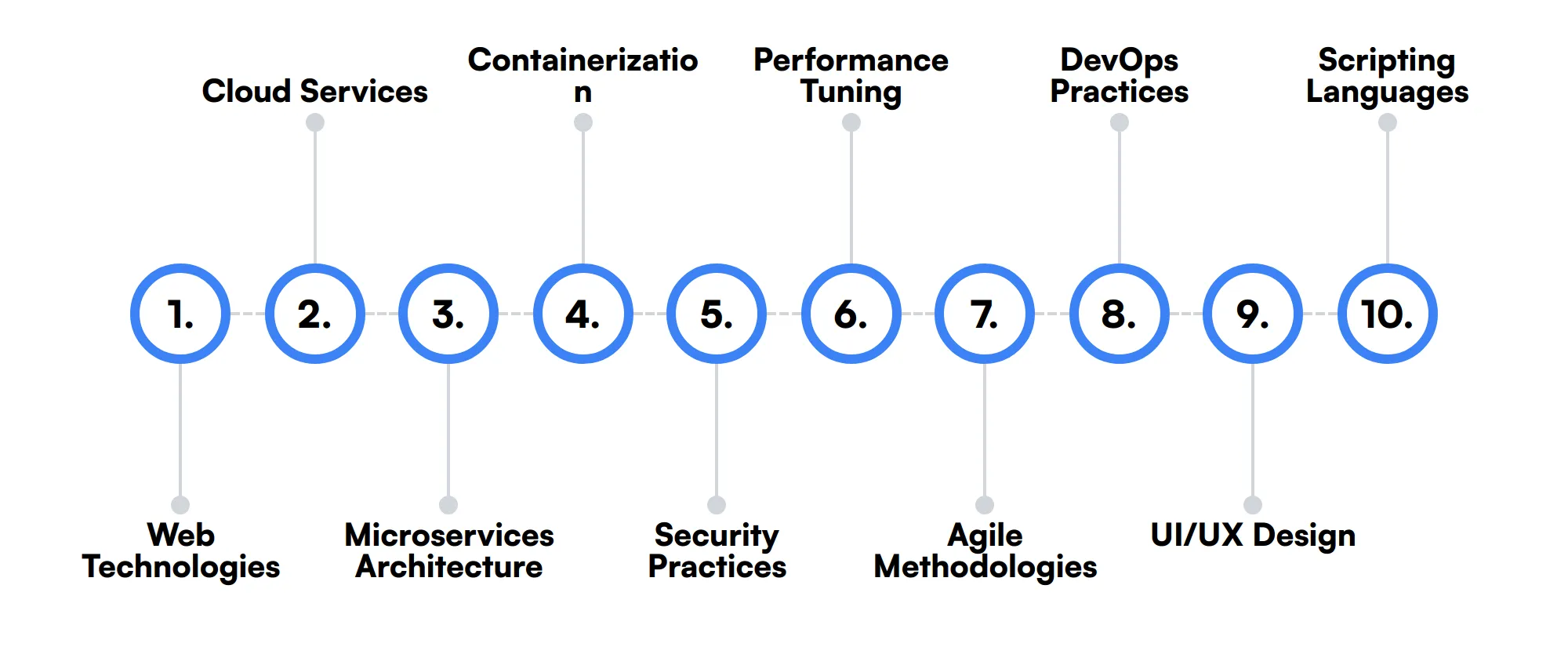
Web Technologies
Familiarity with front-end technologies like HTML, CSS, and JavaScript is beneficial for Java Developers, especially when working on full-stack development projects. This knowledge helps in understanding the entire stack and better integration between front-end and back-end components.
Cloud Services
Experience with cloud platforms such as AWS, Azure, or Google Cloud can be advantageous for Java Developers as more companies move to cloud infrastructure. Skills in deploying and managing applications in the cloud are increasingly sought after.
Microservices Architecture
Understanding the design and implementation of microservices architecture allows Java Developers to build scalable and flexible systems. This architectural style is popular for building enterprise applications that require high levels of agility and scalability.
Containerization
Skills in containerization technologies like Docker and Kubernetes are valuable for Java Developers for creating, deploying, and running applications in isolated environments. This facilitates easier testing, deployment, and scalability in production environments.
Security Practices
Knowledge of security practices is important for Java Developers to protect applications from threats and vulnerabilities. Implementing secure coding practices and understanding security protocols can prevent potential breaches and safeguard user data.
Performance Tuning
Java Developers should be adept at analyzing and improving the performance of applications. This includes profiling applications, understanding bottlenecks, and making optimizations to enhance the application's speed and responsiveness.
Agile Methodologies
Experience with Agile methodologies is beneficial for Java Developers as it promotes adaptive planning, evolutionary development, and continuous improvement, facilitating a more flexible and productive development environment.
DevOps Practices
Understanding DevOps practices can enhance a Java Developer's ability to collaborate with operations teams and help in automating the software development lifecycle. This includes continuous integration and continuous deployment (CI/CD) practices.
UI/UX Design
While not typically central to the role, having a grasp of UI/UX design principles can be a plus for Java Developers involved in frontend development or full-stack roles, helping to create more user-friendly interfaces.
Scripting Languages
Knowledge of scripting languages such as Python or Bash can be useful for Java Developers for writing scripts that automate various development and deployment tasks, enhancing productivity and reducing manual effort.
How to assess Java Developer skills and traits
Assessing the skills and traits of a Java Developer can be a challenging task, given the wide range of technical proficiencies required. From Java Proficiency to Multithreading, a comprehensive evaluation is necessary to ensure that the candidate is well-versed in all the key areas.
Traditional resumes and interviews often fall short in providing a complete picture of a candidate's abilities. This is where skills-based assessments come into play. They offer a more reliable way to measure a candidate's competencies in areas like the Spring Framework, RESTful APIs, and Database Management.
To streamline this process, Adaface on-the-job skill tests can be incredibly useful. These assessments help you achieve a 2x improved quality of hires and an 85% reduction in screening time. By focusing on real-world scenarios, these tests ensure that you are hiring the best fit for your team.
Let’s look at how to assess Java Developer skills with these 6 talent assessments.
Java Online Test
Our Java Online Test evaluates a candidate's knowledge of core Java concepts and advanced topics. This test is designed to assess skills in areas such as Object-Oriented Programming, multi-threading, and working with databases.
The test includes scenario-based and code-tracing questions to evaluate understanding of Java syntax and semantics, web application programming, exception handling, and functional programming with Lambdas & Streams API. It also includes a coding question to assess practical Java coding skills.
Successful candidates demonstrate proficiency in Java data structures, the Collections framework, and SOLID principles. They also show the ability to handle concurrent programming with threads and manage relational databases.
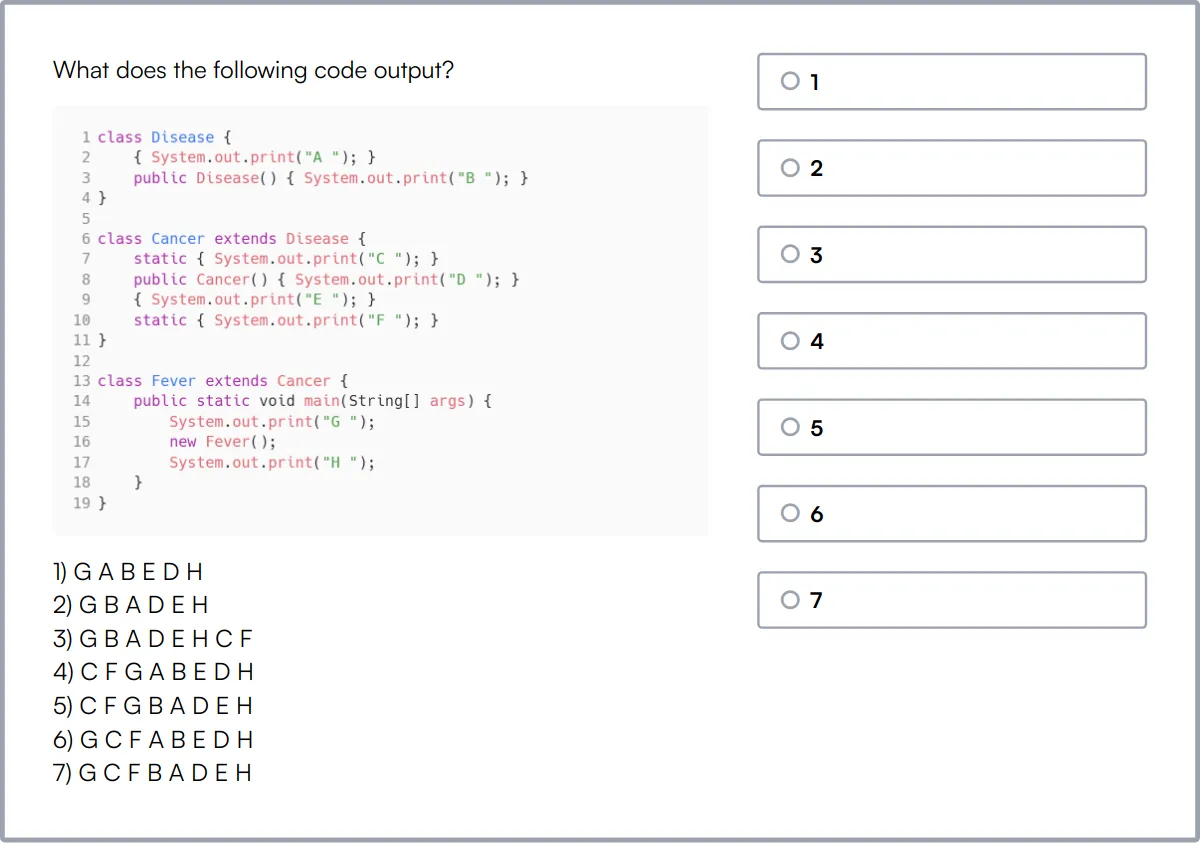
Java & Spring Online Test
Our Java & Spring Online Test evaluates a candidate's ability to work with the Spring framework and their understanding of Java programming. This test covers key areas such as Spring modules, dependency injection, and RESTful web services.
The test uses scenario-based MCQs to assess knowledge of Java OOPs, Spring bean lifecycle, securing web applications with Spring Security, and database integration. It also includes a coding question to evaluate hands-on Java programming skills.
Candidates who perform well demonstrate a solid understanding of design patterns, software architecture, and testing and debugging within the Spring framework.
REST API Test
Our REST API Test evaluates a candidate's understanding of RESTful APIs and their ability to create, interact, and test them. This test covers essential skills for designing and integrating APIs.
The test includes multiple-choice questions to assess knowledge of REST principles, HTTP methods, status codes, authentication, and serialization formats. It also includes a coding question to evaluate practical API development skills.
High-scoring candidates show proficiency in best practices for API design and backend service development, ensuring robust and scalable API solutions.
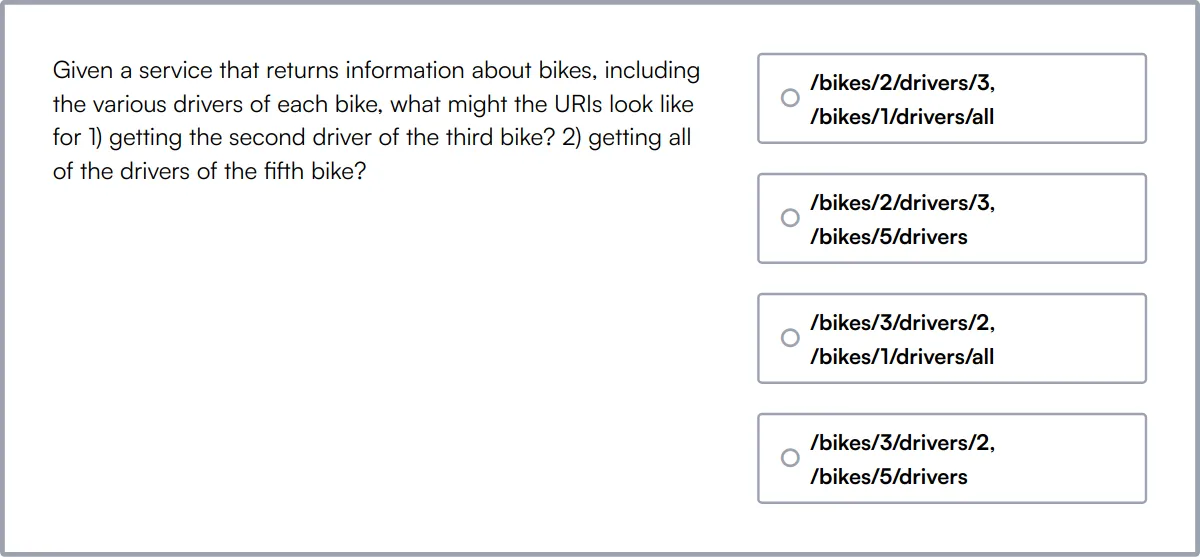
SQL Online Test
Our SQL Online Test evaluates a candidate's ability to design and build relational databases and tables from scratch. This test covers key SQL skills necessary for efficient database management.
The test includes multiple-choice questions to assess knowledge of CRUD operations, joins and subqueries, conditional expressions and procedures, and indexes. It also evaluates the ability to write efficient queries and manage database security.
Successful candidates demonstrate a strong understanding of SQL functions, transactions, and the ability to optimize queries for performance.

Git Online Test
Our Git Online Test evaluates a candidate's understanding of Git, a popular version control system. This test covers both basic and advanced Git commands and concepts.
The test includes scenario-based MCQs to assess knowledge of repository creation, branching and merging, conflict resolution, and remote repositories. It also evaluates the candidate's proficiency in using Git workflows and branching models.
Candidates who perform well demonstrate the ability to manage source code effectively, resolve conflicts, and implement Git best practices in a collaborative development environment.
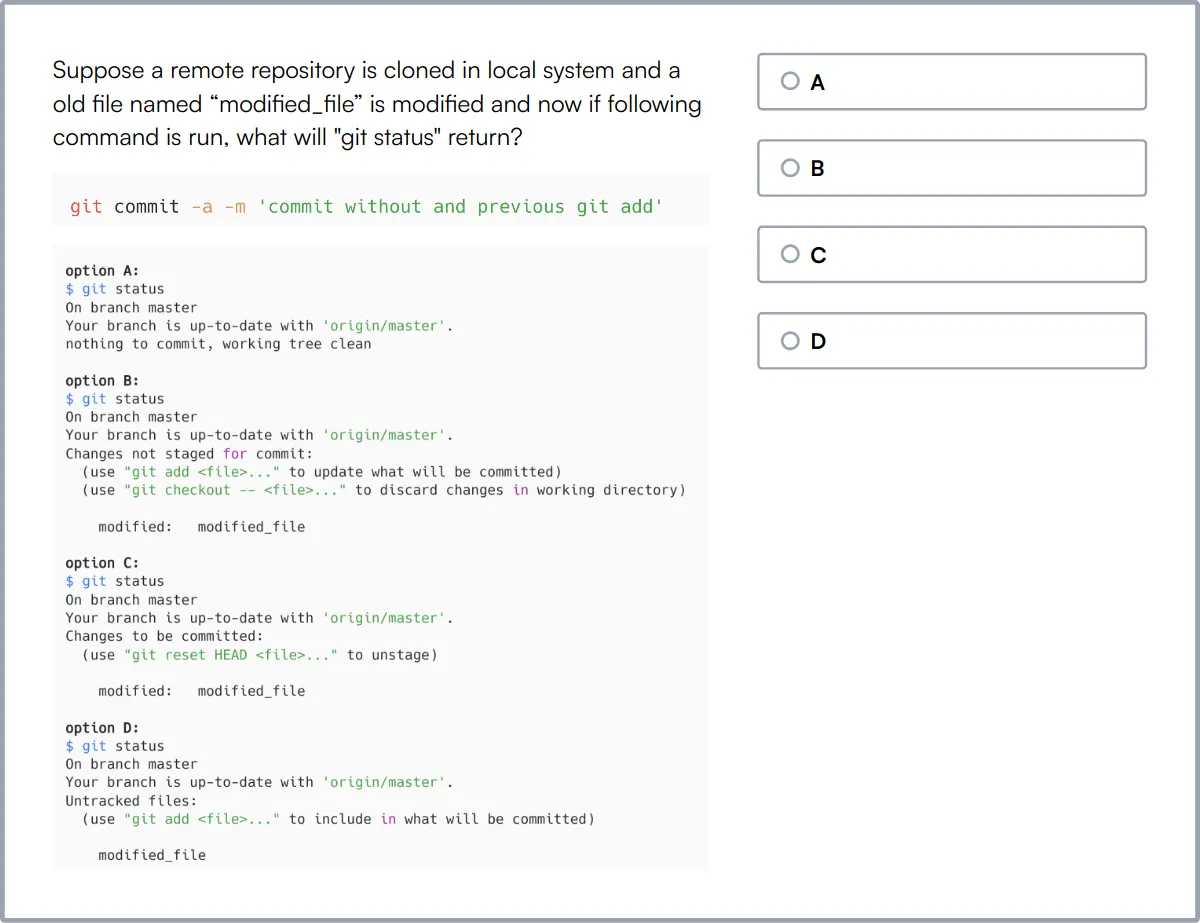
Jest Test
Our Jest Test evaluates a candidate's knowledge of Jest, a popular JavaScript testing framework. This test covers essential skills for testing React and Node.js applications.
The test includes multiple-choice questions to assess knowledge of testing fundamentals, test-driven development, Jest configuration and setup, and mocking and spying. It also evaluates the ability to write effective and maintainable test cases.
High-scoring candidates demonstrate proficiency in async testing, snapshot testing, and integrating Jest with other tools and frameworks, ensuring robust and reliable test coverage.
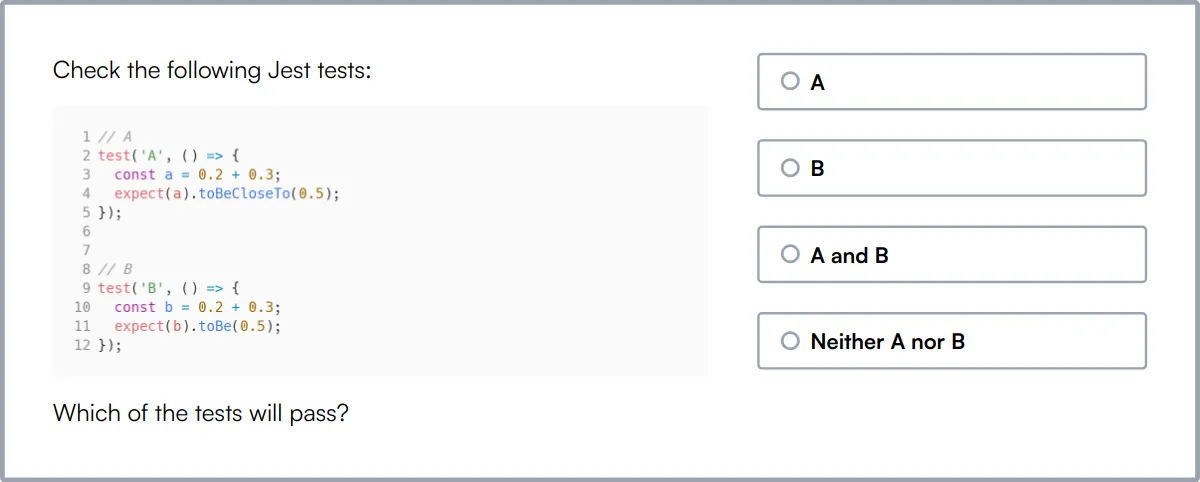
Summary: The 8 key Java Developer skills and how to test for them
| Java Developer skill | How to assess them |
|---|---|
| 1. Java Proficiency | Evaluate the developer's command over core Java concepts and syntax. |
| 2. Spring Framework | Assess the ability to build applications using Spring modules. |
| 3. RESTful APIs | Check the skill in designing and implementing RESTful web services. |
| 4. Database Management | Measure proficiency in handling SQL and NoSQL databases. |
| 5. Version Control | Determine the capability to manage code using Git or similar tools. |
| 6. Unit Testing | Evaluate the ability to write and execute unit tests. |
| 7. Build Tools | Assess familiarity with tools like Maven or Gradle for project builds. |
| 8. Multithreading | Check the understanding of concurrent programming and thread management. |
Java & Android Online Test
Java Developer skills FAQs
What are the key skills to look for in a Java Developer?
Key skills include Java proficiency, Spring Framework, RESTful APIs, database management, version control, unit testing, and build tools.
How can I assess a candidate's proficiency in Java?
Assess Java proficiency through coding tests, technical interviews, and reviewing past projects or contributions to open-source repositories.
Why is experience with the Spring Framework important?
Spring Framework simplifies Java development, offering features like dependency injection, aspect-oriented programming, and transaction management.
What methods can be used to evaluate a candidate's knowledge of RESTful APIs?
Evaluate through coding challenges, asking them to design or critique RESTful services, and discussing their experience with API documentation tools.
How do you test a Java Developer's database management skills?
Test database skills by asking them to write SQL queries, design database schemas, and discuss their experience with ORM tools like Hibernate.
What is the importance of version control in Java development?
Version control, like Git, is important for tracking changes, collaborating with team members, and managing code versions effectively.
How can you assess a candidate's experience with unit testing?
Assess unit testing skills by asking them to write test cases, explain testing frameworks like JUnit, and discuss their approach to test-driven development.
What are the benefits of a Java Developer knowing build tools?
Build tools like Maven or Gradle automate the build process, manage dependencies, and ensure consistent project configurations.
Assess and hire the best Java Developers with Adaface
Assessing and finding the best Java Developer is quick and easy when you use talent assessments. You can check out our product tour, sign up for our free plan to see talent assessments in action or view the demo here:

40 min skill tests.
No trick questions.
Accurate shortlisting.
We make it easy for you to find the best candidates in your pipeline with a 40 min skills test.
Try for freeRelated posts
Free resources



